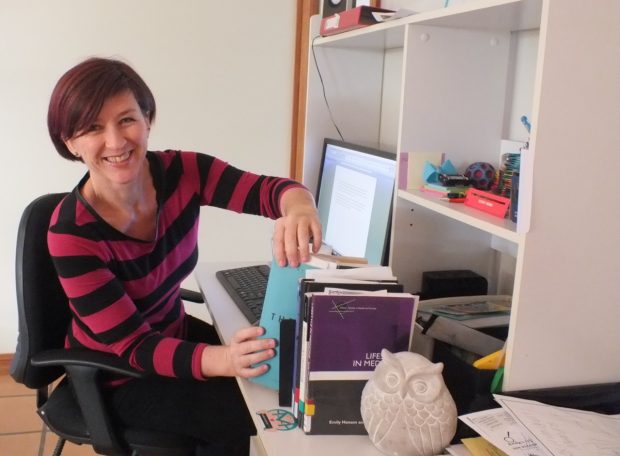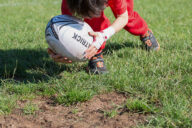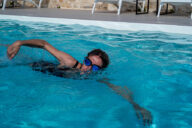Recently I did something I never thought I’d do again – I enrolled in a PhD. After two experiences of postgraduate studies I vowed I would never put myself through the process again. As a PhD student I felt enormous pressure to perform, to make sure I met the final deadline, and as a researcher ‘in training’ I always felt I did not know enough. As I embark on this PhD I have taken some time to reflect on the reasons for my previous studies and how it could be different this time around.
Reflecting back on why I started a PhD in Psychology, I realise I didn’t really know what else to do. Academic achievement had been what I did best so this was a natural progression. I also enjoyed research, was good at it and became enthralled with the postgraduate student lifestyle.
I had my sights set on a good job that paid well and the academic lifestyle looked pretty good, but I can say now that it felt pretty empty and I can see how the enthrallment was all about recognition – recognition for achieving a high level of academic success, for getting your work published, for being an expert in your field.
In less than 12 months I quit the PhD program for a range of different reasons, but primarily because I had to get a job to support myself. I ended up working as a research assistant within the university setting which I thoroughly enjoyed and on reflection I can see that I enjoyed the sense of purpose that working brought, not to mention the substantial pay packet. Being in another country and a bigger city also opened me up to more possibilities of career choice and I became aware of an inner dissatisfaction with the choices I’d made so far in terms of study.
Fast forward 5 years, I was still working as a research assistant at a university and still enjoying it when I became interested in an area of research new to me – Medical Anthropology. As I learned more about medical anthropology and its focus on health and illness in other countries, I decided to do a PhD and chose a topic that would see me return to Africa where I had holidayed a few years earlier. I saw this as a way to make a difference in the world; to improve the health of people in developing countries.
In all honesty it was also an opportunity to run away from a sense of unease with my life at age 30.
At 30 I had a great job, great friends – basically life was one big party – but I felt empty inside. I was single and felt like a failure where relationships were concerned, I was racking up debt and not really clear on what I wanted in life. Going back to Africa for 12 months to conduct research felt glamorous and adventurous but in truth I was just running away and distracting myself from the sadness and emptiness I felt inside.
Back in Australia, busy analysing and writing up my data, my investment in wanting to make a contribution to the world meant I experienced incredible anxiety about what I was actually producing. I always felt like I never knew enough about the theories, my writing wasn’t up to academic standards, and I viewed my supervisors as the experts. This led to a lot of procrastination.
Basically I never saw myself or my work as good enough and so held myself as less than more qualified others. I became increasingly disillusioned with the PhD.
This second foray into postgraduate study had opened my eyes to the reality of the highly competitive nature of academia that I had completely missed, or chose to ignore the first time round! I saw the pressure on academics to both teach, conduct research and publish in highly ranked journals in order to bring in more research funding for the university. PhD students are another avenue of funding, with departments receiving a certain amount of money for each PhD student enrolled. I observed the high levels of stress in the people around me and ultimately decided that was not what I wanted in my life.
My time in Africa also taught me a lot about the realities of the international aid business, and I began to question who is really benefitting, feeling this was not an arena I wanted to work in either. Financial pressures again saw me return to full-time work, which I thoroughly enjoyed, but I wasn’t so sure I wanted to be an academic so I abandoned my PhD.
Ten years later (and still working as a research assistant), here I am again, enrolled in a PhD and this time around, loving it.
I have finally found what I know to be something true that needs to be shared with the world – the approach to health, wellbeing and life presented by Serge Benhayon and Universal Medicine.
The ‘what for’ is for all of humanity.
This PhD has a purpose beyond obtaining another qualification. It is bringing back to humanity truths that have been hidden for many hundreds, if not thousands of years.
I feel no personal investment in it, no sense of having to achieve something to please others, to be recognised, to feel good about myself, or feel that I have some value to the world. What I do have is a sense of clarity about how things are so I find I can read the literature without getting bogged down in it (most times), knowing the truth of this study is in my body, not my head, for I live it on a daily basis. Another significant difference for me is in the relationship with my supervisor, where this time around I find I can hold myself as an equal.
I know that this is due to what I have learned about self-love, self-care and self-responsibility from Serge Benhayon and Universal Medicine. I have come to know that I am enough just as I am, and no piece of paper will change that.
I have come to appreciate all that I bring to the world – both in terms of who I am and what I do, and that I have a responsibility to get on with it and bring this to everyone. I am also learning that it is very possible to invest in myself through self-care, paying attention to what I eat and drink, when I need to sleep, when I work, when I need to stop, when I need support, so that this is a PhD done in, and with love, at every step.
A heartfelt thank you to Serge Benhayon for your unwavering love, support and encouragement is felt every step of the way.
By Michelle, Social Science researcher, BSc, MSc, EPA Acc. Massage Practitioner, Brisbane
Further Reading:
How to Succeed In Academia and Lose Yourself in the Process
Self-Care, Self-Love and Nurturing in University
Self Care at Work Does Make a Difference: PhD





